#tao yuanming
Explore tagged Tumblr posts
Text



Tao Qian (tr. Arthur Sze)
#tao qian#tao yuanming#arthur sze#poetry#poem#the silken dragon#cuvinte potrivite#for us the half-bitten#în cer era târziu
38 notes
·
View notes
Text
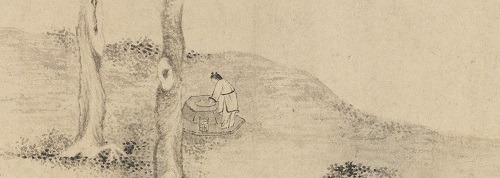
TORNANDO A VIVIR AL CAMPO
IV
Hace mucho que corro monte y balsa, gozando bosque y fraga sin empacho. Teniendo de la mano a mi pequeño, quiebro las matas de un casal baldío. Andamos entre lomos y montículos, rondando las moradas de los idos. Se ven restos de hogares y de pozos; podridas cepas de bambú y morera. Pregunto a tal que va cogiendo hornija: «¿Qué fue de todos los que aquí vivían?». Se vuelve el hornijero y me responde: «Todos murieron, ya no queda nadie». En treinta años mudan villa y corte... tal dicho es verdadero y no vacío. Sólo un lance espectral es nuestra vida, que al fin retorna al seno de la nada.
Tao Yuanming
di-versión©ochoislas
*
其四
久去山澤遊 浪莽林野娛 試攜子侄輩 披榛步荒墟 徘徊丘壟間 依依昔人居 井竈有遺處 桑竹殘朽株 借問採薪者 此人皆焉如 薪者向我言 死歿無復餘 一世異朝市 此語真不虛 人生似幻化 終當歸空無
陶淵明
#Tao Yuanming#literatura china#poesía de las Seis Dinastías#vida rural#vagabundeo#ruina#cambio#fugaz#nada#di-versiones©ochoislas#陶淵明
1 note
·
View note
Text









柄本 佑 || 「光る君へ」 (2024) · 第十回 「月夜の陰謀」
#柄本佑#tasuku emoto#光る君へ#hikaru kimi e#1x10#made by me#fujiwara no michinaga#藤原道長#I am fully aware how much burden is on Michinaga's shoulders but#I just cant help but become a Kaneie stan#I'm a sucker for the Noire-ness of kaneie telling michinaga to snitch on him if the scheme's botched...ughhhhh#can't believe I'm rooting for him now#michinaga wanting to escape based on the (mis?)understanding of a Tao Yuanming Kanshi is some romantic shit tho#and his face when sister does matchmaking for him🤣#did he have lip balm on in some of the scenes? he looks so kissable#(sorry Ando-san. I wont say that again)
2 notes
·
View notes
Text
Did Hua Cheng name his house after Xie Lian's famous saying?
There's a pretty widely circulated post in the tgcf fandom saying that Hua Cheng named his manor Paradise Manor in direct reference to Xie Lian's famous saying "Body in the abyss, heart in paradise". This is a misinterpretation due to translation. Hua Cheng likely did name Paradise Manor after the famous saying, but the "paradise" in paradise manor is meant to be the opposite of "abyss".
Paradise Manor in the original text is 极乐坊, where the phrase 极乐 ji2 le4 is translated as paradise. Actually, this is a translation of Sanskrit Sukhāvatī, and in Buddhism it is often translated as the pure land, or the land of bliss, in which the faithful may be reborn.
Xie Lian's famous saying is translated as "body in the abyss, heart in paradise", and the important translations are the word choice of abyss and paradise. Paradise, here is a translation of 桃源 tao2 yuan2, which literally means peach [blossom] spring. This is a direct reference to a text written during the Eastern Jin Dynasty by Tao Yuanming (陶渊明) called 《桃花源记》 "The Tale of the Peach Blossom Spring". The text tells a tale that takes place during the reign of the Xiaowu Emperor 孝武帝 (376-397 CE) of the Jin Dynasty, in which a fisherman finds a mysterious cave with a peach blossom spring in it, in which a population of people had lived there since escaping the turmoil of the Qin Dynasty several centuries prior, and who were so removed from the world in their little community that they had never heard of the Han Dynasty which followed the Qin, or the Three Kingdoms period that followed, and certainly not the Jin. Thus I would argue this phrase 桃源 should be translated as heart in utopia and not heart in paradise. At the very least, this paradise is NOT the same paradise as Hua Cheng's paradise.
But, it's not a baseless belief that Hua Cheng named his house after Xie Lian's motto, and this is where the abyss comes in. This is a translation of 无间 wu2 jian1 which refers to Avīcinaraka, also Sanskrit and also a Buddhist concept. This is a level of hell in which those who have committed the ten unforgivable crimes are reborn, and it is sometimes translated into English as interminable, or incessant, because the suffering here has no gaps -- it is incessant. In that way, 极乐 and 无间 the paradise and the abyss between Hua Cheng and Xie Lian form a more direct parallel, both originating as Buddhist concepts describing where a person may be reborn based on their behavior in their past life, and this is a clearer paired set of concepts than the two being compared in Xie Lian's original motto. So I believe it truly can be said that Hua Cheng named Paradise Manor for Xie Lian, but not in the way that those who only read the English might think -- those two "paradises" are actually very different concepts.
#hualian#tgcf#tian guan ci fu#hua cheng#xie lian#heaven official's blessing#tgcf meta#translation meta
99 notes
·
View notes
Text
tgcf, a reflection.
it's about opposite halves; "body in the abyss, heart in paradise" (Xie Lian, vol. I, ch. 1) had to be an oxymoron. i noticed how it manifests itself throughout the novel, both its sintactic structure and its semanthic implications; in my opinion, it's the essence of the story.
so, Xie Lian enshrines the grave of a ghost he himself struck down on a bridge with his reflection: body in the abyss, heart in paradise, or 身在无间,心在桃源. 无间 is the avīci or worst level of Buddhist hell: 无间 translates to no space/rest. hours before his death, the ghost had declared that such an abyss is none other than the human world. paradise or 桃源 literally means "peach blossom spring," which refers to a utopian, hidden land from a poem by Tao Yuanming. in the poem, a man comes to this land of peach blossoms by chance, marvels at the eternal peace that reigns there, and returns to share the location to the world, yet the place is gone.
my interpretation is as follows: while the physical body and everything tangible suffers incessantly, one's heart, 心 which is also the spirit/nature of something, has to reach, also incessantly, for such a paradise which is nowhere since it's not a real place but a state of mind we all develop individually and we call it freedom.
Xie Lian is condemned to live up to his own precept. the worst tragedy at one point is that he cannot die, so he's unable to escape the abyss of perpetual torture, a gradual one that is triggered by his first hubris. Xie Lian oscillates between being the sacrificial lamb of the Heavens (he does, indeed, share several characteristics with the messianic archetype) to the one who carries the axe as a result of the corruption of his body, soul and morals. and it's not only in him that the phrase manifests itself. other characters, such as Shi Qingxuan, Yin Yu, Xuan Ji, Jian Lan, the Four Calamities or Jun Wu become both victims and victimizers of their own 无间, carefully interweaving stories into a single work quite similar to greek tragedies of fatal destiny, such as Oedipus or Prometheus in chains. the author further plays with this dual and contradictory nature of the oxymoron in individual scenes, aided by visceral, folkloric and epic symbolism (i'll reflect on my favorite scenes in a near future). furthermore, a brilliant narrative parallelism is created between Xie Lian and Bai Wuxiang, whose mask is fittingly with one half smiling and the other half crying to project this madly antithesis onto Xie Lian, hiding any human traits he may still have.
to all this, the phrase raises the question of the paradox of Theseus; with so many irremediable changes, what makes you you? in the novel, more than 800 years pass since the death of the ghost on the bridge. Xie Lian and Hua Cheng are in front of a campfire on the seashore. Xie Lian tells him: "to me, the one basking in infinite glory is you; the one fallen from grace is also you" (vol. IV, chap. 63). Xie Lian doesn't mean that such opposites to which the self is deconstructed and subjected conform one whole exclusively, for that's but the result of the tangible 无间, but what we do with it. he, at the climax of his corruption, managed to remain true to himself and stop a catastrophe thanks to a small gesture of kindness that nevertheless describes something much bigger. "i want to understand your everything," Xie Lian continues; though transient, both opposing halves deserve to be loved equally. that man who handed him a bamboo hat loved him, for a few seconds, with wholeness. the 桃源 perchance can be found cathartically; the 桃源 is the eternal faith towards oneself. absolutely no one fought Xie Lian's battles but him, literal and figurative, nor did anyone had to. it was enough to believe in him, and to make him believe that he can believe in his own freedom again. suddenly, what's tragic transforms (again, a contrary) into a miracle: Xie Lian, thank heavens, cannot die. as for him and his shared fortune with Bai Wuxiang, they bifurcate in the end, both "endings" complementing each other, in spite of everything.
24 notes
·
View notes
Text
责子 - Admonishing (my) sons
by 陶渊明 (Tao Yuanming, ~365 - 427)
白发被两鬓 肌肤不复实 bái fà bèi liǎng bìn jī fū bù fù shí White hair greys both temples, skin sags, no longer firm -
虽有五男儿 总不好纸笔 suī yǒu wǔ nán ér zǒng bù hǎo zhǐ bǐ though blessed with five boys, none have love for paper and brush.
阿舒已二八 懒惰故无匹 ā shū yǐ èr bā lǎn duò gù wú pǐ A-Shu now twice eight, is so lazy none can compare.
阿宣行志学 而不爱文术 ā xuān xíng zhì xué ér bù ài wén shù A-Xuan, coming to fifteen where others pursue study, dislikes all things literary.
雍端年十三 不识六与七 yōng duān nián shí sān bù shí liù yǔ qī Yong and Duan, aged thirteen, find strangers in the numbers six and seven.
通子垂九龄 但觅梨与栗 tōng zi chuí jiǔ líng dàn mì shí lízi yǔ lì Tongzi who is nearly nine, seeks only pears and chestnuts
天运苟如此 且进杯中物 tiān yùn gǒu rú cǐ qiě jìn bēi zhōng wù Now if Heaven’s will is truly thus, drink up, whatever’s in the cup
………………………………………………………………………………………….
Notes
(translations below are all mine):
This is a homework poem - from many weeks back xD - that I’d like to share. It’s by Tao Yuanming, a poet whose lifetime spanned the late Eastern Jin Dynasty and early Liu Song Dynasty.
I really like his writing, and one thing I appreciate a lot about it is that he (usually) writes very plainly, but if we think about it a little, we can uncover hidden delights! He’s also just a very cute* person in general, which I think is what makes reading his works such a pleasure xD It also feels quite safe leaving this poem without any commentary because of the above mentioned quality of his writing - perhaps the only thing that needed some clarification was 志学, which was glossed in the translation anyway.
So! Feel free to leave a message and tell me if I’m right, and also what you spot!
Also, as Jing said in the chat, tag yourself! Which lazy kid are you? :P
Oh and Tao Yuanming is a super famous writer of the Northern and Southern Dynasties actually, so you can probably look him up very easily if you want to. I’m just trying something different with him where I want to go through all of his works, and then go snooping through other people’s writing about his life.
* I said he was very cute earlier. Here is proof in his 归园田居·其三 Retiring to Fields and Home (part three).
种豆南山下 - Planting beans ‘neath the Southern Mountains, 草盛豆苗稀 - weeds abound, while the seedlings are sparse. 晨兴理荒秽 - Rising with the dawn to cull the weeds, 带月荷锄归 - retiring with the moon and a shouldered hoe; 道狭草木长 - the paths are narrow, the grasses tall, 夕露沾我衣 - and the evening dew dampens my clothes. 衣沾不足惜 - But dampened clothes aren’t worth lamenting, 但使愿无违 - so long as my ideals and actions, aligned, remain.
When he’s in a lighthearted mood, he likes to raise his readers’ expectations or tease at something and then reveal a hilarious twist. And often it’s very good naturedly self deprecating without being disparaging or underselling himself, so you laugh with him but not at him.
For example, in an earlier part (Part Two) of the above poem, he talks about the peaceful rural retirement with down-to-earth neighbours and the things he is doing with his land. Then in part three, he starts off with a romantic-ish image only to dash it immediately with the next paired line, stated soooooo proudly. It gets funnier with every addition as you realise how hard he worked to get that result. But then there is a twist again - he says, all this and he doesn’t mind! Why not? Because it was his choice. Bro is truly committing to the unworldly farming life.
…Anyway, there are six parts to 归园田居. I highly recommend reading it all if you can because I’m totally not doing him any justice xD
For all of y’all who can read Chinese with a bit of help, here is another piece of his writing related to his kids. They make quite a number of cameos in his other poems, but I chose this one because it's actually addressed to them! He was writing in anticipation of the birth of his first son - if internet sources are to be believed.
Note: Veryyyyyyy rough, first draft-y sort of translation. I was just trying to get the meaning across as easily as possible.
命子 - Guidance for my son 悠悠我祖 爰自陶唐 邈焉虞宾 历世重光 御龙勤夏 豕韦翼商 穆穆司徒 厥族以昌 Long, long ago, my ancestor lived; Yao, who was of Tao and Tang. In the distant past, honoured at Yu, Danzhu paved glory for generations after. Surnamed Yulong, they served in Xia, as Shiwei, were wings to Shang; Great Minister over the Masses, Tao Shu led our clan’s rise.
纷纷战国 漠漠衰周 凤隐于林 幽人在丘 逸虬绕云 奔鲸骇流 天集有汉 眷予愍侯 The chaos of the Warring States, the fall of weakened Zhou; the Feng fades into his forest, hermits retire to their mountains. The Qiulong winds through cloud, whales ride monstrous waves; heaven-blessed was the coming of Han, it favoured Marquis Min.
於赫愍侯 运当攀龙 抚剑风迈 显兹武功 书誓河山 启土开封 亹亹丞相 允迪前踪 Illustrious Marquis Min; the time for him and his Emperor just arrived. Sword in hand against the wind, he achieved impressive martial feats. Fulfilling his lord's promise of everlasting glory, he was bestowed land, titles. And a tireless, diligent Chancellor followed in the footsteps of his father. 浑浑长源 蔚蔚洪柯 群川载导 众条载罗 时有语默 运因隆窊 在我中晋 业融长沙 The gushing of a river long from its source, the luxuriance of towering trees; all streams began from somewhere, all branches grow from some trunk. There is time to speak or be silent, for fortune has sharp vicissitudes; In our Jin at its zenith, Changsha’s brilliant achievements shined.
桓桓长沙 伊勋伊德 天子畴我 专征南国 功遂辞归 临宠不忒 孰谓斯心 而近可得 The fearsome, heroic Duke Huan of Changsha, with outstanding merits and virtue upon whom the Son of Heaven bestowed a hereditary title, leads wars in the South. Victory achieved, he retires home, unwavering despite glory and favour. Who dares say that such a heart can be easily found in recent times?
肃矣我祖 慎终如始 直方二台 惠和千里 於皇仁考 淡焉虚止 寄迹风云 冥兹愠喜 Rigorous he was, my grandfather, careful to the end as he was at the start. Fair and upright was his influence at Court; wisdom spread through his lands. Praiseworthy was my late fathers benevolence, though he sought no fame. He gave himself to Office and took both gain and loss with equanimity.
嗟余寡陋 瞻望弗及 顾惭华鬓 负影只立 三千之罪 无后为急 我诚念哉 呱闻尔泣 Lamenting my ignorance, I look to my ancestors, unable to reach their heights. I was ashamed, for despite my greying hair, alone in my family I stand. Among three thousand crimes, gravest - to leave no descendants. Over this I was deeply worried… until I heard your babbling cries.
卜云嘉日 占亦良时 名汝曰俨 字汝求思 温恭朝夕 念兹在兹 尚想孔伋 庶其企而 Observing the portents on this good day, divining this to be a good time, I named you Yan, gave you the courtesy name of Qiusi. Be respectful and aspiring day or night; remember well your name as Kong Ji remembered his. Such is my wish for you.
厉夜生子 遽而求火 凡百有心 奚特于我 既见其生 实欲其可 人亦有言 斯情无假 A diseased man’s son was born at night; with lamp and urgency he went to check. Every person, being ordinary, would have such a worry; I am no different. Witnessing your birth, truly, I wish for your future success. Though something often said by man, the sentiment in this is sincere and true.
日居月诸 渐免于孩 福不虚至 ��亦易来 夙兴夜寐 愿尔斯才 尔之不才 亦已焉哉 Days and months will pass swiftly, my son will leave childhood behind. Fortune's roots are always there, disaster also easily arrives. Be diligent: rise early, sleep late; may you be blessed with talent and success. But if you do not, then alas, though that is also fine.
(Referenced this source and this one for annotations)
I thought the intertwining of the imagined past and illustrious connections with traceable ancestors, grandparents and parents was a very charming way of expressing this narrative. Especially so when you think about the way the whole longass grandmother story is told shapes the message to his son! Noticing his efforts to emphasize the great achievements that could come about because of opportunity and fortune right after his rather soul stirring introduction (Parts 1 and 2) was DELIGHTFUL and actually very touching.
What makes a man good? Diligence, steadiness and dedication to doing what is good and right. What makes a man great? First, opportunity i.e. luck, but also, most importantly - strength of character - not losing sight of his heart despite power or fame.
All that leads up to his concluding verses - that it's human nature for parents to wish sincerely that their children will do well, so that their own regrets in life do not repeat. But the world is so unpredictable! Just do your best to lay the foundations for fortune when it arrives, then let things happen as they will, and let's be contented whatever the outcome.
Just taking his attitude at face value, what an un-stressful way to live life :D !!!!!!!!
And after reading this poem, how do you feel about Admonishing Sons that we started with in this post? GO read it again!
I love him so much.
33 notes
·
View notes
Text
mlcb ficlet: red thread of fate, ot3
A soft ticklish sensation awakens Li Lianhua as he twitches his foot awake. Blearily, he opens his eyes and meets the twin gazes of Fang Xiaobao and Di Feisheng. They each have a hand wrapped around one of his bare ankles and the ticklish sensation that had awoken him is the sliding of red silken cord against his skin. Red thread encircles his ankles, flush against skin.
“It’s lotus silk,” Fang Xiaobao says. The natural curve to his mouth is nonexistent with none of his hurt outwardly to twist. Yet his eyes are dark and deep with a well of sorrow that Di Feisheng’s gaze mimics. Li Lianhua looks away.
Cautiously, Li Lianhua withdraws his feet from their calloused grasps, and he shivers at Fang Xiaobao’s parting stroke and Di Feisheng’s parting squeeze. There is a chill in the room that raises the hair on his skin. He shifts into a sitting position and brings his knees up to his chest. His robes fan down to cover his bare feet as a blanket remains crumpled at the foot of the bed where the other men sit like protective statues.
Like sliding on an operatic mask, Li Lianhua lets the disquiet of his awakening fade away to an insouciance that smooths the planes of his face. “Red threads?” he questions with a smirk tugging at the edges of dry lips.
Fang Xiaobao only stares at Li Lianhua, unperturbed by the mockery of the question. “For all that you want to die alone,” he says, “you should know that not even Meng Po could make us forget you.”
“Ah, Xiaobao,” Li Lianhua tuts, “even the moon waxes only to wane just as the flowers bloom only to fall.”
Di Feisheng scoffs. “Your sophistry does not negate our grief,” he says bluntly. “We searched the thirty-six cities of nine states, sixteen rivers, and the twenty-eight mountains for you.”
“Your shiniang found you before us,” Fang Xiaobao says devastatingly.
And Li Lianhua freezes as he circulates his qi through his meridians. Given time, he would be recovering the entirety of his power and on the cusp of immortality, he could even surpass his prior peak. A life for a life, he thinks, as his heart judders not from weakness but from the sorrow taking root in his chest. His chest burns; his throat burns; and his eyes burn as an ache works its way up.
“I did not want this,” Li Lianhua says with a shuddering breath. He wraps his arms around his raised legs; he feels like a child again. Even now, his mind betrays him as a memory of Shan Gudao arises. Once Li Xiangyi had burned with a fever on the streets—he had been shivering with cold and Shan Gudao had desperately embraced him. By then, his brother had been dead and he supposed that Shan Gudao had always liked being depended on. There was something about that embrace that had nestled deep into his soul; it was the uncomplicated intimacy of it that reality could no longer allow in his life.
Something in Li Lianhua shatters with the response Di Feisheng offers.
“Nobody wanted you to give up and die either,” Di Feisheng says.
“Di-mengzhu,” Li Lianhua says hoarsely. “‘The bird in the cage longs for its former woods, while the fish in the pond misses the deep.’”
“You quote Tao Yuanming as if the jianghu is your worldly cage and we your worldly affairs to abstain from,” Fang Xiaobao comments.
“Li Lianhua,” Di Feisheng says slowly, as if savoring the name upon his tongue, “why run from those who love you?”
“If you loved me—,” Li Lianhua begins sharply.
“You wanted to die with dignity,” Fang Xiaobao says with a bitterness he must have cultivated from the seeds of the grief Li Lianhua planted. “You wrote that letter and you thought that all loose ends must have been severed…”
“It was selfish,” Di Feisheng says.
And Li Lianhua smiles as a tear finally escapes his pooling eyes to trail down his cheek, wetting the collar of his robes. “You found me—wasn’t that selfish of you? Was it so hard to fulfill a dying man’s wishes?”
“But you didn’t have to die,” Fang Xiaobao damns. “Why couldn’t you let us help you?”
“Help me?” Li Lianhua says coldly. “My shiniang is dead!”
“So, you’re the only one who can decide the terms of their death? Your shiniang wanted to help you. She was tired too,” Fang Xiaobao says.
Li Lianhua closes his eyes for a long moment, tears squeezed out in trails shimmering in candlelight. “Why couldn’t you let me go?” Li Lianhua finally says.
“We love you,” Di Feisheng says.
“The ending you wrote for us could never have worked—not when what we wanted was you,” Fang Xiaobao says.
“A-Fei, Xiaobao,” Li Lianhua entreats, “you don’t love me. You love the ghost of Li Xiangyi. I don’t want to fight with you, A-Fei. I can’t be your shifu, Xiaobao. I’m so…tired.”
Without even a rustle of his robes, Fang Xiaobao leaps to his feet to sit at Li Lianhua’s side at the top of the bed. This is what he uses Yangzhouman for: to hug a ghost. His arms are warm and strong around Li Lianhua as Di Feisheng looms nearby.
Li Lianhua tries to swallow down the sobs in his throat, but it is like a drowning person swallowing the ocean to survive—inescapable. The porcelain of his heart finally cracks with the propagation of old and new hurts. In the candlelight, his mask cracks and saltwater leaks. His body shakes and he seethes with the shame of it—of his damnable weakness. It contradicts his intent to free them to live their lives; they did not need him.
Nobody ever truly wants to die. In the moment, death seems preferable, but in the next moment, the enormity of the loss strikes and for some, it is too late. For Li Lianhua, there is nothing wrong or right about this moment in Fang Xiaobao’s arms. It is a moment that needs to pass for too long has Li Lianhua lived in the stasis of Li Xiangyi’s character.
Li Lianhua could never move on until Li Xiangyi was dead in one way or another.
(feel free to join my mysterious lotus casebook discord server.)
36 notes
·
View notes
Text
Tiān Guān Cì Fú Hanakotoba Analysis Part 1

◤━━━━━━━━━◥✿◤━━━━━━━━━◥
-> 1) Peach Blossom/Plum Blossom/Cherry Blossom
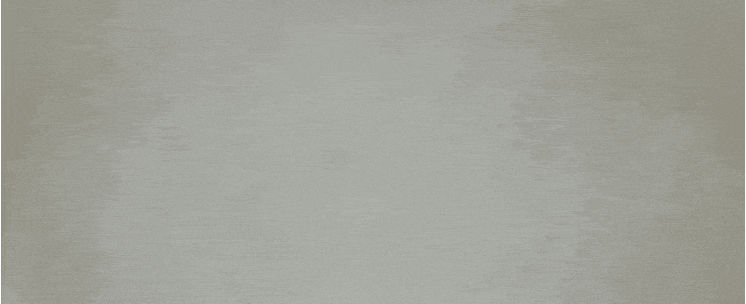
While the flowering trees featured in the donghua as well as in its opening credits, official artwork and ending credits could be plum blossoms (Prunus mume) or cherry blossoms (Prunus serrulata), they are most likely to be peach blossoms (Prunus persica). Despite the fact that they can be difficult to differentiate between at times, especially when referencing a drawing, these three blossoms do have a few distinguishing features, which are as follows. Peach blossoms have pointed petals, plum blossoms have rounded petals, and cherry blossoms have a notch at the tip of their petals. Peach blossoms produce two flowers from a single node, whilst plum blossoms produce one flower per node and cherry blossoms produce several flowers per node. Finally, while plum and cherry blossoms develop leaves after their blossoms fall, while peach blossoms seem to produce leaves concurrently with flowering. Despite these distinctions, these flowers are frequently confused with one another, resulting in a significant overlap in their symbolic meanings throughout different cultures; thus, my decision to feature them all here.
1.1) Peach Blossom

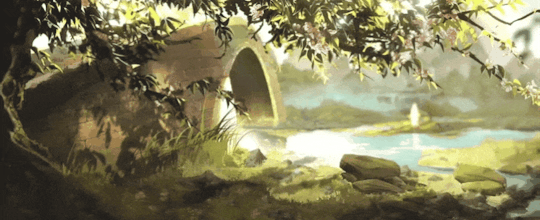
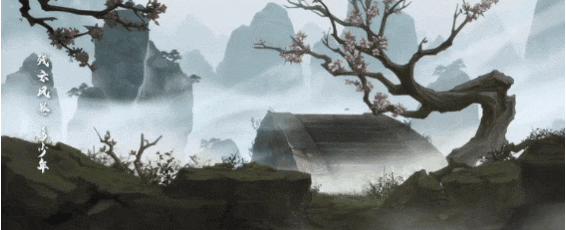
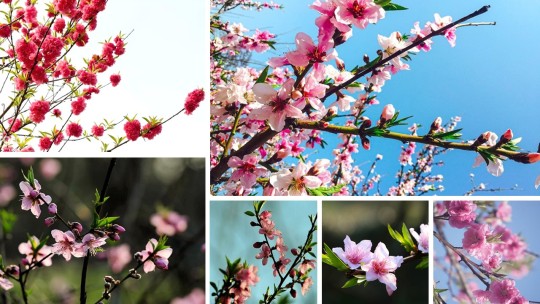
Peach blossoms are known as táohuā (桃花) in Chinese. They symbolise immortality, vitality, longevity, peace, good luck, success and prosperity in Chinese culture. Furthermore, peach tree wood was believed to protect humans from evil spirits, therefore branches were hung above doorways to drive demons away, and peach wood wands were used in exorcisms. Furthermore, its Chinese name “táohuā” has the figurative meaning of “luck in love affairs; luck in love”. Peaches are also known as senki or senka in China (meaning tree or fruit that gives power to the gods), and it has been believed since ancient times that peaches have the divine power to grant people perpetual ageing and longevity. Peach blossoms are known as momo (桃) in Japanese. Its meanings in hanakotoba are “I am your captivator”, “invincible under heaven” and good-natured. Its symbolic meaning of "invincible under heaven" stems from the fact that peach has traditionally been used to fend off evil spirits and as a spiritual medicine for immortality. In Western floriography, peach blossoms symbolize longevity, gentleness, honour, peace, happiness and generosity. The peach blossom also has the meanings "I am your captive" and "your charms are unrivalled qualities." The peach blossom has been used as a symbol of renewal and growth in Western literature.Xie Lian’s infamous quote “Body in the abyss, heart in paradise” (MXTX, p. 6) is translated from the original “Shēn zài wú jiàn, xīn zài táo yuan” (身在无间, 心在桃源)—which can be roughly translated as “Body in Wujian, heart in Taoyuan”. The word "paradise" in his quote actually corresponds with the Chinese phrase "táo yuan" (桃源)—which is short for táohuāyuán (桃花源)—which means "peach blossom valley," and is a saying for paradise/heaven. The phrase is taken from the title of Tao Yuanming's 421 CE fable, which details a chance discovery of an ethereal paradise where its inhabitants live an ideal existence in harmony with nature for centuries, remaining oblivious of the outside world. This phrase can also refer to an idealistic place of serenity and rest, but it is also used to refer to an unrealistic fantasy. Additionally, the peach blossom’s symbolic meanings of immortality, longevity, good luck, generosity, honour, good-natured, prosperity and “invincibility under heaven” as well as its association with gods and divine power suit the attributes of the heavenly realm—which is where they are primarily seen in the series—as well as the values its officials are meant to aspire to. The tree’s symbolic meanings of “your charms are unrivalled qualities”, “luck in love”, renewal and growth greatly complement Xie Lian and Hua Cheng’s relationship. Despite having his luck sealed away and being catastrophically unlucky from then on, Xie Lian was extremely fortunate in discovering profound and enduring love. Furthermore, Xie Lian's immense generosity and compassion for people, albeit an unattainable ideal for many, was part of what drew Hua Cheng to him: "If your dream is to save the common people, then my dream, is only you" (MXTX, p. 1953). This corresponds to the peach blossom's association with dignity, serenity, charity, and "unrivalled charms". The scene in the second season's ending theme visuals during which a peach tree branch is shown enduring weather conditions throughout all four seasons is a representation of Hua Cheng's patience and dedication while searching for Xie Lian during the 800 years between the latter's second banishment and third ascension. It also parallels Xie Lian's patience and fidelity while waiting for Hua Cheng's return after the final battle.
1.2) Plum Blossom


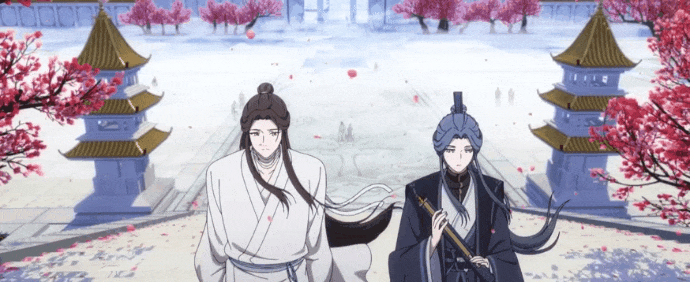
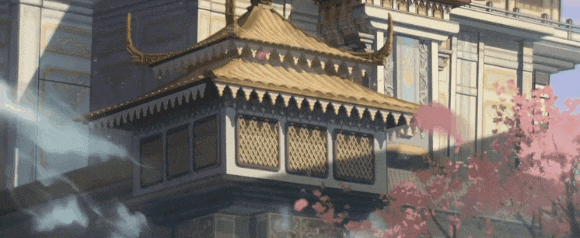
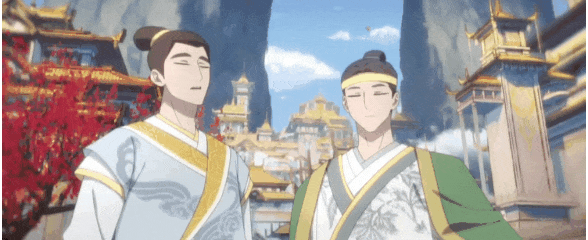
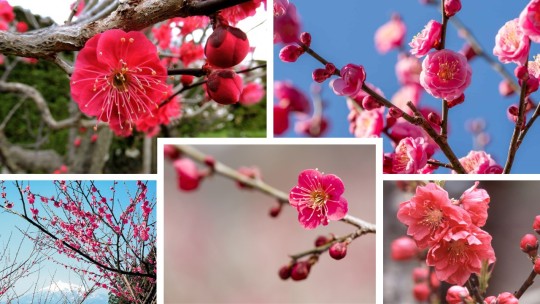
Plum blossoms are known as méihuā (梅花) in Chinese. They hold the symbolic meanings of endurance, perseverance, vitality, inner strength, hope and thriving through adversity in Chinese culture because they are one of the hardiest flower species in the world and blossom during winter defying all the vagaries of winter weather. When their blossoms valiantly emerge during the latter weeks of winter, they are seen as a hopeful omen of spring and are treasured for their splendour during the darkest time of year. Plum blossoms thus herald the arrival of spring and signal the end of winter. Plum blossoms are also China's national flower, serving as a national symbol. Plum blossoms are associated with longevity because their blossoms remain in flower for a month. Plum blossoms can also represent those with a strong personality who are unafraid of difficulties. In Japan, plum blossoms are known as ume (梅). Its meanings in hanakotoba include integrity, patience, elegance, loyalty and faithfulness. In Western floriography, plum blossoms symbolise keeping promises, fidelity, beauty and longevity. Plum blossoms are also associated with the end of winter and represent hope, tenacity, perseverance, courage, and beauty's capacity to overcome adversity. Furthermore, plum blossoms represent prosperity, fruitfulness, beauty, purity, and good fortune. Wild plum blossoms in particular represent independence. The intricate dynamics of Hua Cheng and Xie Lian's relationship are complemented by the symbolic meanings of hope and the onset of spring evoked by plum blossoms. After 800 years of roaming alone, Xie Lian meets Hua Cheng. Bringing a sense of fulfilment, excitement, and happiness to his life that he hadn’t felt in a long time; as he told Hua Cheng, "Only after meeting you, did I rediscover that it's such a simple thing to be happy" (MXTX, p. 1060). Plum blossoms can also represent individuals who possess strong personalities and are not intimidated by challenges, which complements Xie Lian's character well. Despite being subjected to tremendous adversity, he continues to be as unyielding and resilient as he was before his first banishment, remarking, "I might not be able to decide whether the road is easy or not, but whether I walk it is entirely up to me" (MXTX, p. 1125). The plum blossom’s symbolic meanings of integrity, patience, fidelity, perseverance, courage, beauty, independence and elegance also complement Xie Lian’s character. The plum blossom’s symbolic meaning of keeping promises greatly aligns with Hua Cheng’s character, especially when referencing his declaration to Xie Lian near the end of the novel, "There is no banquet in this world that does not come to an end...but I will never leave you. I will come back...Your Highness, believe me" (MXTX, p. 1954). True to his promise, he defies death once more to return to Xie Lian after replenishing his spiritual power for an indeterminable amount of time. Hua Cheng’s unwavering devotion to Xie Lian is a core part of his character which also ties into the plum blossom’s meanings of fidelity, loyalty and faithfulness. Hua Cheng’s favourite poem referenced in the novel—Ache of Separation by the Tang poet Yuan Zhen—is a reference to his immense devotion. The poem states “After seeing the vast sea, no water can compare; Scattered from the peak of Mount Wu, there are no other clouds… Many times I’ve passed through the flowers, yet I spare them no glance; For half my fate is in cultivation, and the other half, in you.” This poem, which is akin to Hua Cheng's feelings for Xie Lian, describes the poet's unwavering love and devotion for his late wife Wei Cong and how nothing and no one else can compare to her presence in his life. This once more relates to the plum blossom representing devotion, loyalty, and fidelity.
1.3) Cherry Blossom
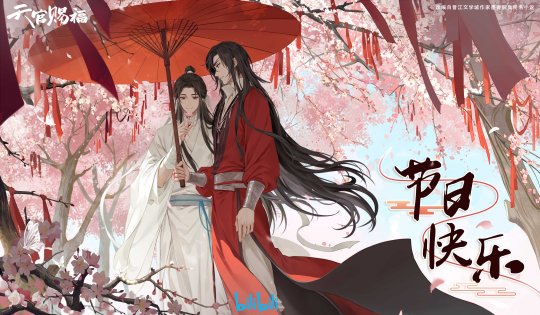
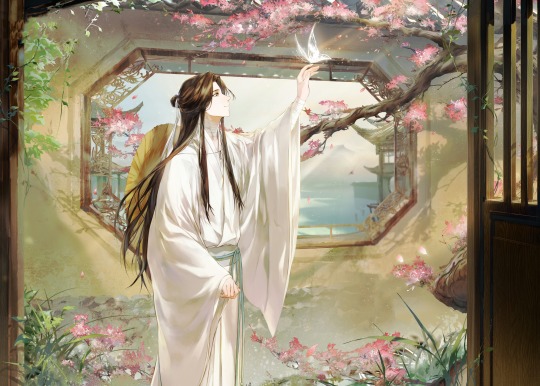
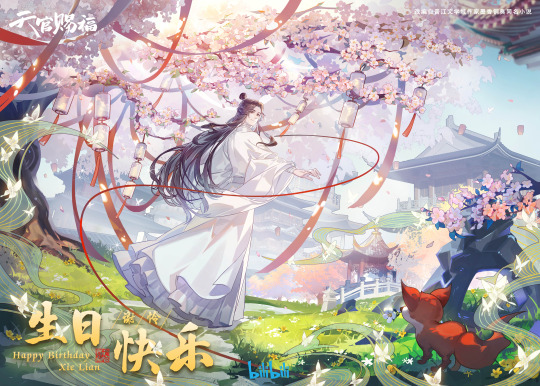
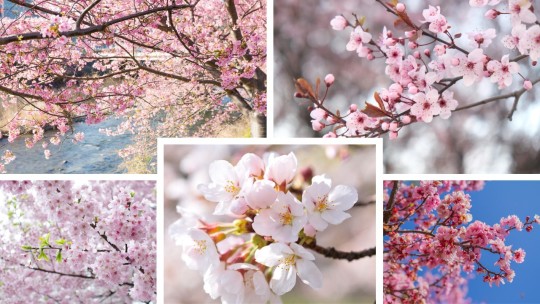
The cherry blossom (Prunus serrulata) is also known as the Japanese cherry and is the unofficial national flower of Japan. Its Japanese name Sakura (桜) has been derived from the word “saku” which means “to bloom”. Its meanings in hanakotoba are “beauty of spirit”, grace, chastity, excellent beauty, gentleness, good education and the “transience of life”. In Japan, cherry blossoms are also a symbol of the “beauty of impermanence”—a Shinto concept better known as “mono no aware” (物の哀れ) as their falling petals are a reminder that although life is short, it is beautiful and should be savoured. The Japanese concept of “natsukashii” (懐かしい) likewise emphasizes the fleeting nature of cherry blossoms. This concept refers to the happy-yet-wistful nostalgia for times and things that we will never be able to go back to. We will never get to experience those moments again, just like the ephemeral cherry blossoms, which makes them even more significant. Cherry blossoms bloom from March to April which is the start of the new fiscal year in Japan. As a result of this cherry blossoms have also come to symbolise new beginnings and springtime. Given that feudal Japanese soldiers associated cherry blossoms with honour, discipline, and dignity—falling flowers were thought to be symbolic of a Samurai's death. In Western floriography, cherry blossoms herald the changing of the seasons and symbolise renewal and rebirth. They also symbolise the fleeting nature of life, tenderness, forgiveness, strength, beauty, love, confidence, peace, friendship and gratitude.
In China, most of the Cherry blossom’s Japanese symbolic meanings are more strongly associated with plum blossoms. Cherry blossoms are known as yīnghuā (樱花) in Chinese and symbolise life, beauty, femininity, power and mysteriousness in Chinese culture. While still occasionally connected to the concepts of life and death, Cherry blossoms are more connected to the concepts of love and romance as well as beauty and femininity in Chinese culture.
Cherry blossoms are primarily associated with the transiency of life. In Xianxia novels like Tiān Guān Cì Fú, where characters can achieve immortality through cultivation, themes such as the transiency of life are not majorly relevant. However, in Tiān Guān Cì Fú, gods are powered by the faith and worship of their followers and without this faith they would fade into non-existence. These Heavenly Officials are not all-powerful but are beholden to fate like all other living things and are capable of death. It was also stated by MXTX, that Heavenly Officials banished or not, are not included in the wheel of reincarnation after death. This reaffirms that while long-lived, “when humans ascend, they are still human; when they fall, they are still human” (MXTX, p. 541). Xie Lian’s first 2 ascensions and subsequent banishments are also reminiscent of the fleeting nature of life—“He ascended to the heavens quickly, but his fall from grace was even faster” (MXTX, p. 10). At one moment he was “the crown prince who pleased the gods”, at the pinnacle of prominence and the next he was “the laughingstock of the three realms”. This ties in with the cherry blossom’s representation of the fleeting nature of life. Xie Lian’s words to Hua Cheng in chapter 31—“Those who have known each other for decades can become strangers in a day. We've met by chance, and we may part by chance. If we like each other then we shall continue to meet; if we don't, then we shall part. At the end of the day, there's no banquet in the world that doesn't come to an end, so let's go all more with the flow, and I'll say what I want to say” (MXTX, p. 267)—are also reminiscent of the fleeting nature of life.
The Cherry Blossom’s association with the “happy-yet-wistful nostalgia for times and things that we will never be able to go back to” is reminiscent of Xie Lian’s halcyon days before his first ascension as well as the friendship of the Xianle Trio before the fall of Xianle. Additionally, the cherry blossom also symbolizes strength, dignity, “beauty of spirit”, peace, forgiveness gratitude, friendship and tenderness which are all qualities that can be associated with Xie Lian.
-> 2) Peony
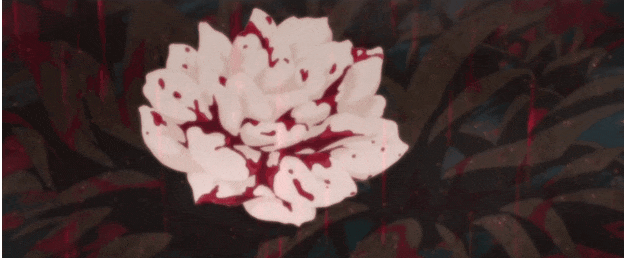


“At the corner of the jade altar table sat a tiny, lonesome flower. A far-gone memory surfaced in Xie Lian’s mind, and he was momentarily stunned. It was like a dust-covered picture, but when he tried to wipe it clean, it remained blurry. Unspeaking, he frowned and loosened his grasp to pick up that flower. Hua Cheng put down his brush as well and slowly began to grind some ink. “What’s wrong?” Xie Lian smiled. “Nothing. Just…this flower’s scent is refreshing. I’ve always liked this sort.” Offerings of flowers in temples and palaces were far from rare. However, most devotees offered large, fresh bouquets of bright red or purple blossoms, or handcrafted imitation flowers that never wilted. After a pause, Xie Lian said, “Could this be the flower which Crimson Rain sought?” Hua Cheng smiled. “Gege has such godly premonitions.” (MXTX, pp. 765-766) Despite the flower Hua Cheng shielded from the blood rain after raiding Qi Rong's hideout—“…a shower of blood rain poured down from the skies. He saw a flower was getting battered by the bloody rain, so he tilted his umbrella and shielded it” (MXTX, p. 120)—earning him the alias "crimson rain sought flower”, it is never named in the novel. It is however confirmed to be the same kind of flower he always places as an offering on the altar of Xie Lian's temple. In the donghua however, it is portrayed as a white peony (Paeonia). Peonies are known as mǔdān (牡丹) in China and were regarded as China’s national flower during the Tang Dynasty (618 to 907 A.D.). In accordance with this, they symbolise prosperity, honour, wealth and beauty, love and happiness. The Chinese term for peonies means "the most beautiful” while other Chinese names for peonies are "fùguìhuā" and "huawang," which translate to "king of the flowers" and "flower of riches and honour," respectively. In Japan, peonies are called botan (牡丹) and symbolize shyness, wealth and regalness in hanakotoba. The flower's profound appearance, notably its multitudes of large petals that are thin and silk-like, is considered to be where the peony symbolising wealth and regalness originated. In Western floriography, peonies represent bashfulness and compassion. It is speculated that the reason Hua Cheng shielded the white flower to prevent it from being stained by the blood rain is because he associated the flower with Xie Lian.
-> 3) Wild Rose
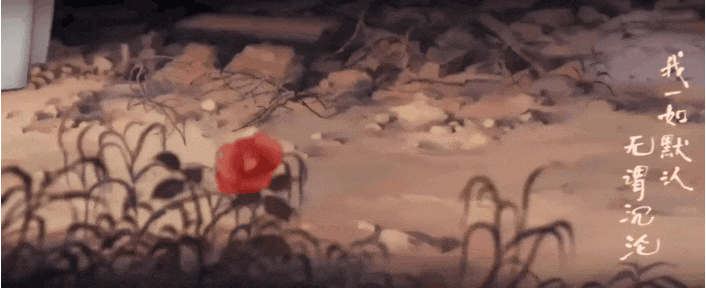


The flower featured in the above panel is likely a red rose. In China, roses are known as méigui (玫瑰), and in accordance with their universal symbolism, they are strongly associated with romance, passion and love. Thanks to the Chinese monthly rose (Rosa chinensis), which blooms in almost every month of the year, creating a "spring" that never ends, roses are also associated with longevity and the perpetual spring in China. Considering that the colour red is auspicious, red roses are also thought to bring good fortune in China. In Japan, roses are called bara (薔薇) and its meaning in hanakotoba is love and beauty. Red roses in particular symbolize affection and passionate love; while rose thorns represent “happiness in misfortune”. In Western floriography, roses symbolize love, passion, beauty, romance and secrecy. Red roses symbolize enduring passion, desire, affection and romance. A single rose is said to symbolize love at first sight. The rose flower’s symbolic meanings of enduring passion, romance, “love at first sight” and secrecy tie in well with Hua Cheng and his motivations—“My beloved is a brave, noble, and gracious special someone. He’s saved my life; I’ve looked up to him ever since I was young. But, I wanted to catch up to him more, and become an even stronger person for him. Although he might not remember me well. We never really talked. I want to protect him” (MXTX, p. 1953). The wild rose flower depicted in the opening is seen wilting as Xie Lian walks by leaving only thorns. This could be a depiction of how Xie Lian’s naïve, fragile passion from his youth has long since wilted leaving behind someone wiser who is able to find happiness in misfortune and life’s simplicities. The scene could also possibly be an allusion to how in the novel’s original character concepts Xie Lian was supposed to become a flower god in charge of flowers blooming and wilting after being banished.
◣━━━━━━━━━◢✿◣━━━━━━━━━◢
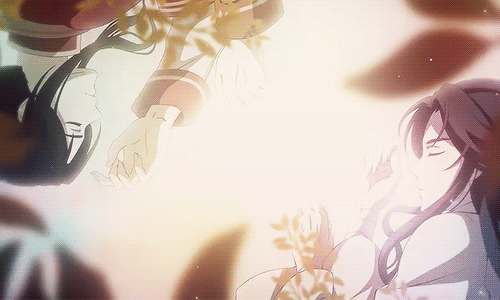
╰┈➤ Part 2 𐀔
╰┈➤ Anime Hanakotoba Posts Directory
[I had to split this post in half due to Tumblr's image/gif limit so please find part 2 on my blog. Also, I wanted to post this on the release date for S2 of the donghua but felt like the post wasn't ready yet so decided to postpone it till this week. If you liked this post, check out my other hanakotoba analysis posts... Also, if I've gotten any of the kanji, romaji, hanzi or pinyin incorrect, feel free to correct me]
#tgcf#tian guan ci fu#mxtx#mxtx tgcf#mo xiang tong xiu#donghua#danmei#anime#anime hanakotoba#hanakotoba#floriography#hanakotoba analysis#tgcf donghua#tgcf season 2#tgcf s1#tgcf s2#heaven official's blessing#hualian#hua cheng#xie lian#san lang#sanlian#hua cheng x xie lian#hua cheng/xie lian#huaxie
72 notes
·
View notes
Note
Mind if I throw you a curve ball? I’m looking for Chinese writers/poets who were influential on Premodern Japanese literature besides Bai Juyi (aka Bo Juyi, Po Chü-i, Bai Letian, Po Letien, Haku Rakuten, etc.). Tang dynasty poets are pretty awesome but I need to branch out.
Here are a few that we came up with:
Zhuangzi (莊子, Sōshi): Zhuangzi, a Daoist philosopher and writer, influenced Japanese literature through the spread of Daoist and Zen Buddhist thought. His ideas about spontaneity and the unity of all things had an impact on Japanese poets and philosophers.
Tao Yuanming (陶淵明, Tōenmei): Tao Yuanming, a poet of the Eastern Jin Dynasty, was known for his pastoral poetry and themes of rural life. His influence can be seen in Japanese literature, particularly in works that celebrated the beauty of the countryside.
Su Dongpo (蘇東坡, So Tōhaku): Su Dongpo, also known as Su Shi, was a versatile Song Dynasty writer who excelled in poetry, prose, and calligraphy. His philosophical and literary works had an impact on Japanese literature, especially in the fields of poetry and essay writing.
Hopefully this helps!
142 notes
·
View notes
Text


















Substance, Shadow, and Spirit [remixed, abridged] by Tao Yuanming
#liv in the replies#patrice bergeron#boston bruins#brad marchand#do you ever think about how brad marchand said that when bergy retired he would retire or are you capable of normal thought i'm not at all#please say a gratitude for both my sanity& y'all that this poem (which has been saved in my camera roll with the vague idea of using it for#??? long) & not one of the poems i had saved for carey for a really long time & remixed & everything with another poem until i found a poe#that absolutely murdered me in cold blood but there is an alternate universe where i did& then had to explain my unhinged thoughts to you.#anyway how are we feeling about bergy retirement. pspspspsp sara & luna are y'all doing okay like. the doc title for this one was#patrice the hockey player means a lot to me but patrice the person means so much more#which is why the end line of the other poem was so *%"@^)! (you love / what you are) because patrice does. like he is a whole ass good huma#& now since no one asked i need to tell you all the details about everything also y'all please clap i made an edit with NO baby pictures#although i did find one & save it & minimal genres of photo i always use in edits because they're my taste & aesthetic but anyway.#when i saved the first photo and marked it as one i wanted i accidentally wrote “how will he know they love him” which is not the line but#makes me feel feral about patrice & the rest of them all had hurtful names too but also. the third picture is literally a CELLY like brad#just scored a goal & he is clinging to bergy for dear life with that shit i saved that as “oh the agony on his face for unendurable”#& yes it is one of my cliches to have a draft day picture but in my defense the lifelong bond that patrice has/d with boston deserved to be#there even if i put in the love story & YES that picture is from the 2011 playoff right below it shared joy & pain & i couldn't tell you#when the brad marchy photo for together forever is except for the fact that i saw it & just the gut punch of oh my god the way he looks at#things men will praise you for is the stanley cup. duh. but i love the contrast of “some deed” being the stanley cup but then#bergy's choice to do noble deeds (ends up still earning praise &that's my note to his efforts outside of hockey we love a supportive captai#should also mention the first two i came up with & had the photos i knew i wanted for were the first and last one alskaldk but i KNEW i#wanted chara somewhere in the paragraph about leaving & then while i was looking found the one of bergy playing tuukka on accident & yes#i do have to make goalie jokes every time. no reprieve . no dice/no deal/no goal goalies have no rest/reprieve etc etc the one that killed#me though was looking for a patrice award pic & i wanted basically the one that i got for “how will you know any will praise you” & instead#also got the picture of patrice winning the some community hero award for charity work that he does & i love him mama & of COURSE that puck#is from bergy's 1000 game who do you think I am (if you guessed sleepy and emotional about patrice you'd be right) and ALSO please be ready#for all the patrice posts/bruins posts that have been sitting in my drafts to be released on this occasion of patrice retirement#I FORGOT TO MENTION THAT TUUKKA ALSO RETIRED THAT’S WHY HE WAS ON WISE OR SIMPLE NO REPRIEVE AND THAT LATE OR SOON WAS ALWAYS GOING TO BE#CHARA BECAUSE CHARA LEFT FIRST TO GO TO THE CAPS AND THEN LEFT IN RETIRMENT HE LEFT SOON BUT NOT FOR REAL THEN LATER LEFT FOR REAL (RETIRED
56 notes
·
View notes
Note
happy last gijaeha gtuesday of the year! may we have an excerpt to celebrate? 🤲🥺
happy last gijaeha gtuesday of the year!! in celebration, i offer a snippet from the scene set during ch 133-140 which i just keep going back to tweak even though i'm supposed to be on ch 155 now <3

fun fact: at first glance, the lines jaeha quotes are from the idiom “士为知己者死,女为悦己者容”, however, the first part is actually supposed to be the line “君子死知己” from the poem 咏荆轲 (ode to jing ke) by tao yuanming. there's no tangible difference in english (at least as far as my translation skills go) but 士 also means scholar/soldier/person trained in a specific field while 君子 refers to a man of noble character, and i just think that jaeha would be more likely to use the latter to describe gija.
#i wanted to pick one of the moments related to their zhiji-isms (to yaoibait my danmeiutuals into reading akayona huh what who said that)#anyway the footnotes on this thing are gonna be wild and all o' youse better read them!#asks#*#akayona#gijaeha#happy gijaeha gtuesday <3
2 notes
·
View notes
Text
Kasımpatı topluyorum gelişigüzel örülü çitin altında / Sakince güney dağlarını izliyorum.
Tao Yuanming
2 notes
·
View notes
Text
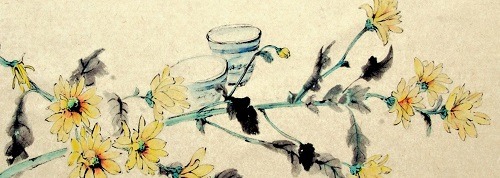
BEBIENDO VINO
III
Hará mil años se perdió la Vía; de lo que siente nadie suelta prenda Quien tiene vino, de beberlo duda, mirando sólo su mundanal nombre. Tener en tanto precio nuestra hechura nace cierto de ser la vida una. Una la vida, que nos dura ¿cuánto…? más rauda que un relámpago se escapa. Rampa que rampa apenas llega al siglo; ¿qué vamos a lograr con estos mimbres?
V
Mi choza he levantado entre la gente, mas no hay rumor de coches ni caballos. Quizá os preguntaréis cómo es posible: todo es retiro si se aparta el alma. Bajo la barda corto el crisantemo; desocupado, miro la montaña. La montaña vahea en el ocaso, tornan los pájaros volando juntos. Hay un sentido verdadero en esto… argüir quisiera, faltan las palabras.
VII
Los ásteres de otoño se coloran; corto unas flores que el rocío baña. En el licor de olvido las anego; lejano siento el mundo y sus pasiones. Una taza me sirvo solamente, luego de suyo el cántaro se aboca. El sol se pone y cesa el movimiento; clamando van las aves a emboscarse. Cara a levante, silbo muy jarocho; por ahora me place esta existencia.
XVII
En el corral la recatada orquídea guarda su olor para la brisa pura. Mas levantando repentina racha, del plateado ajenjo se distingue. Si al caminar la antigua senda pierdes, acógete a la Vía, acaso salgas. Vista la luz, tus pasos no desandes: muertas las aves se desecha el arco.
Tao Yuanming
di-versión©ochoislas
*
飲酒二十首
其三
道喪向千載 人人惜其情 有酒不肯飲 但顧世間名 所以貴我身 豈不在一生 一生復能幾 倏如流電驚 鼎鼎百年內 持此欲何成
其五
結廬在人境 而無車馬喧 問君何能爾 心遠地自偏 採菊東籬下 悠然見南山 山氣日夕佳 飛鳥相與還 此中有真意 欲辯已忘言
其七
秋菊有佳色,裛露掇其英。 汎此忘憂物,遠我遺世情。 一觴雖獨進,杯盡壺自傾。 日入群動息,歸鳥趨林鳴。 嘯傲東軒下,聊復得此生。
其十七
幽蘭生前庭,含薰待清風。 清風脫然至,見別蕭艾中。 行行失故路,任道或能通。 覺悟當念還,鳥盡廢良弓。
陶淵明
#Tao Yuanming#literatura china#poesía de las Seis Dinastías#hipocresía#interés#espontaneidad#expansión#reserva#inefable#di-versiones©ochoislas#陶淵明
1 note
·
View note
Text
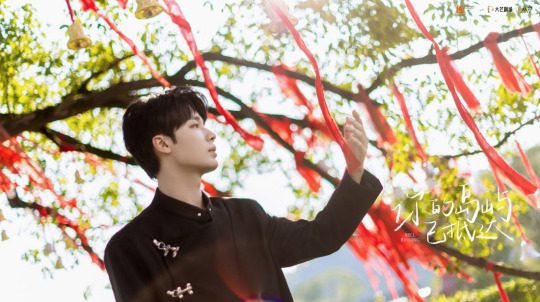

New drama "Bell Ringing" 《你的岛屿已抵达》 Info Post
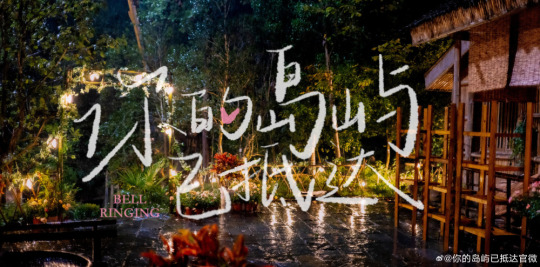

Genre: modern pastoral island romance, with ancient costume part Format: short length; twelve 20-25min episodes Starring: Li Daikun 李岱昆, Amber Song Fangyuan 宋芳园, Miao Weilun 苗维伦, Yu Yilei 余逸蕾, Russell Zhuang Yuan 庄源 Platform: Mango TV Booting ceremony: 2023-10-13 [Source] Wrapping ceremony: 2023-11-01 Premiere: 2024-02-22 Filming location: Changde Peach Blossom Spring, Hunan Province [Img Source]
Drama info (plot, characters, location photos) + more pics (including booting and wrap ceremonies) under the cut.
Updated 2024-02-24
Booting Ceremony
October 13, 2023

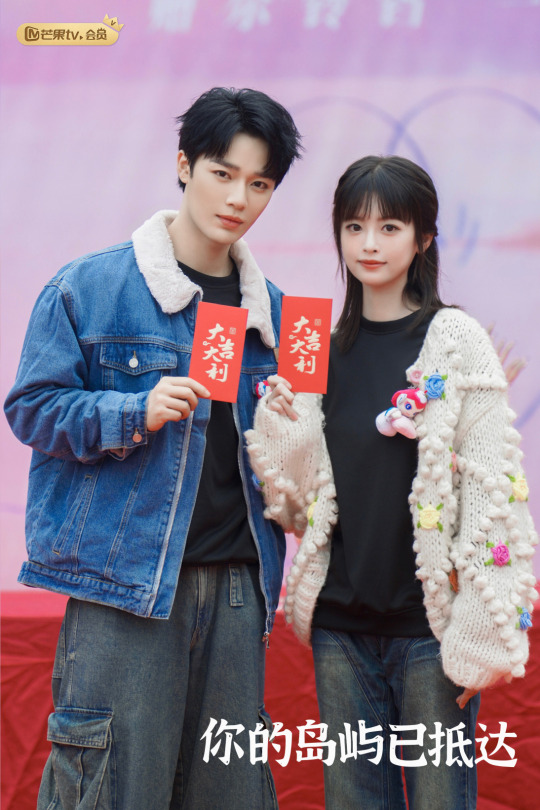
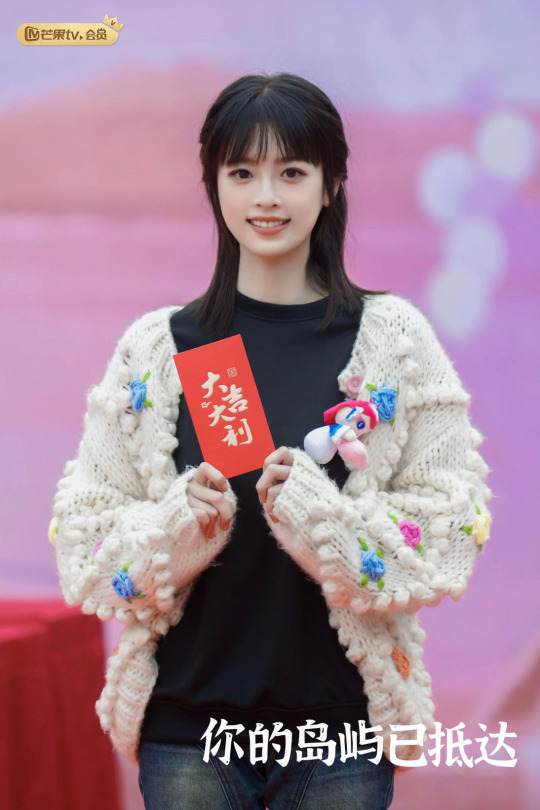

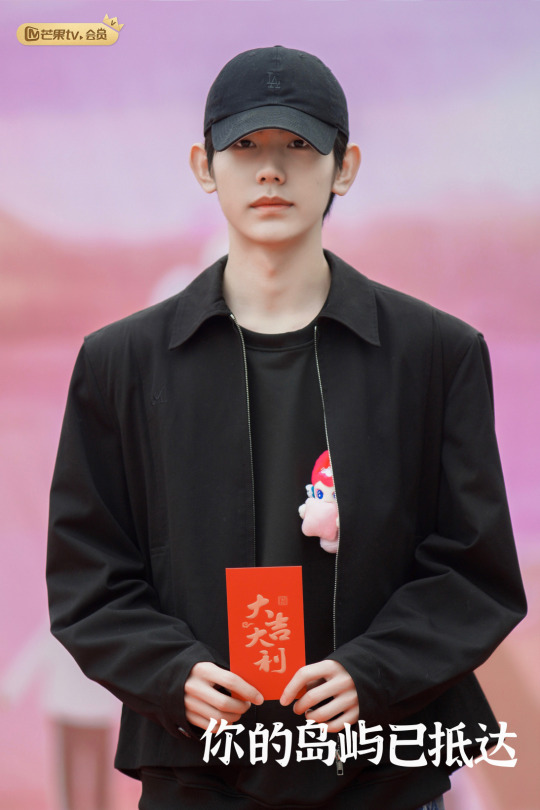
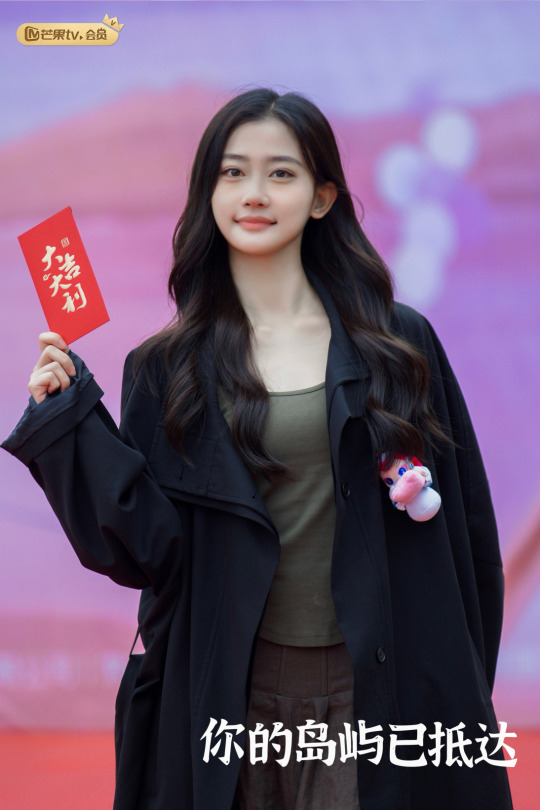


[Source] No, I do not know why they're wearing those plushies on their jackets.😂


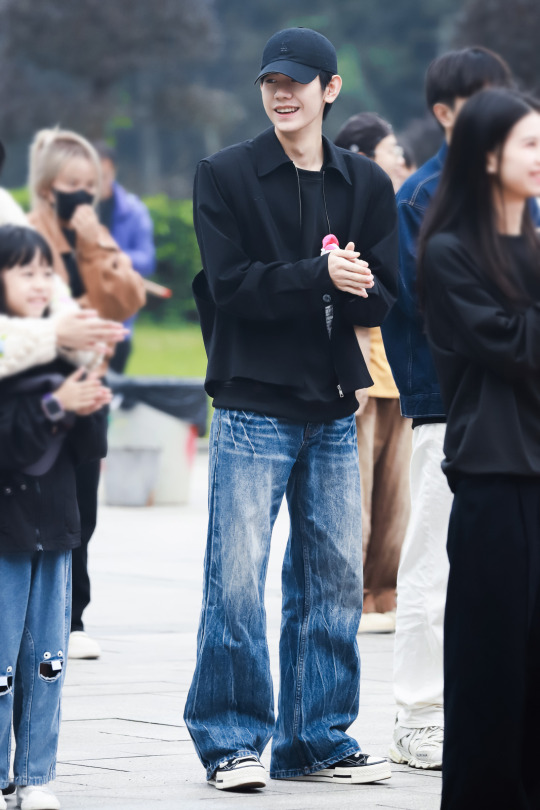
Sources: [-1-] [-2-] [-3-]
Drama Information


[Source] Google-translated into English on the left, and the original Mandarin on the right
Note! I don't know Mandarin, so please take this with a grain of salt, but what I gather, summarizing and piecing the parts together (and doing this as an attempted service to anyone else who is interested but also doesn't understand the language), is this:
Plot & Character Summary Five hundred years ago, Chi Ye 迟野 (played by Li Daikun) was a ruthless, cold-blooded killer, but his life changed when he met and fell in love with Shen Qi 沈七 (Song Fangyuan), an unassuming orphan. However, a tribal war broke out, and, to end it, she died by his sword. The two are reunited in the current timeline, in which Chi Ye is the immortal guardian of the rural Silver Bell Island, and Shen Qi has been reincarnated and lives a carefree life, until others pressure her into getting married. Qi Yang 齐杨 (Miao Weilun), a humorous guy, is a veterinarian and the only doctor on the island (Note: So he treats humans, too). He treasures love above all, and his life is disrupted by the arrival of a woman. Luo Fei 罗菲 (Yu Yilei) is a citywoman who goes to the island on vacation/sick leave. She becomes Shen Qi's confidant and advisor - based on dramas they watch. Due to an incident where she destroys Qi Yang's medicinal herb garden, she's forced to work again to pay off the damage. Xiao Cai (Zhuang Yuan) is Chi Ye's personal assistant, and knows the secret he keeps.
If any Mandarin speakers are willing to correct/amend, please do! Thanks in advance!
Note: Edited to fix some details post- drama premiere.
Li Daikun: "Modern drama! But there are also costumes!😱" [Source]
Filming Location
常德桃花源 - Changde Peach Blossom Spring Changde Prefecture, Taoyuan County, Hunan Province
According to [wikipedia], Changde's Taohuayuan, or Peach Blossom Spring, is a famous tourist location, known for its beautiful scenery and its peach blossoms (which we're in the wrong season for, sadly).
The name comes from a fable written by Tao Yuanming in the year 421, and the phrase has come to mean "an idealistic place of beauty and repose, although it is sometimes used to refer to an unrealistic dream" [Source], which feels fitting for this drama's plot and mood.
Miao Weilun and Zhuang Yuan have posted some photos of it:



Sources: [-1-] [2 & 3]
They took boats to the filming location every day. Source: [Miao Weilun comment] on [this post]
Other Official Promo Images
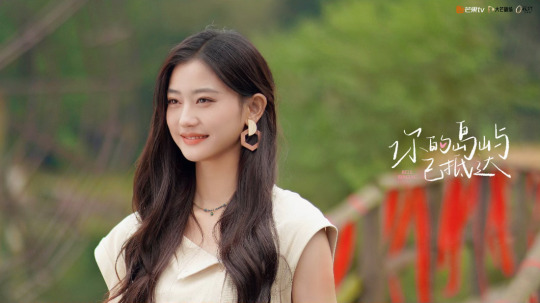
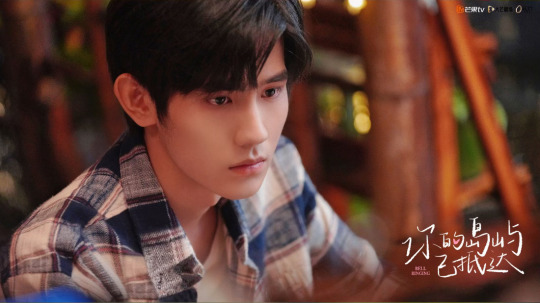
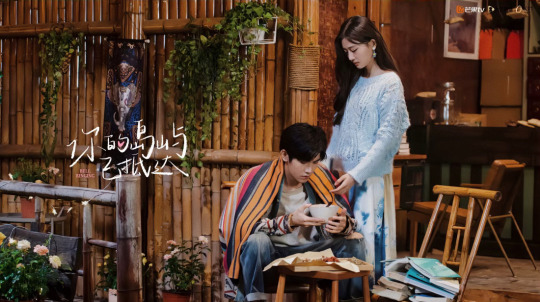
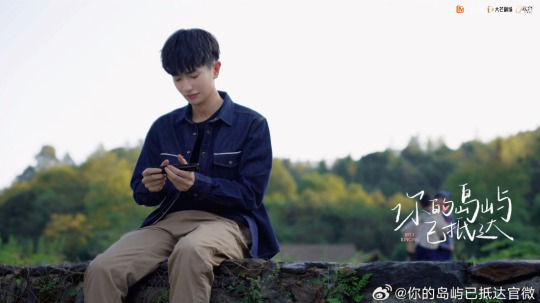
[Source]
More Photos
Uploaded by Miao Weilun, who we thank for posting so many pictures. [Source]
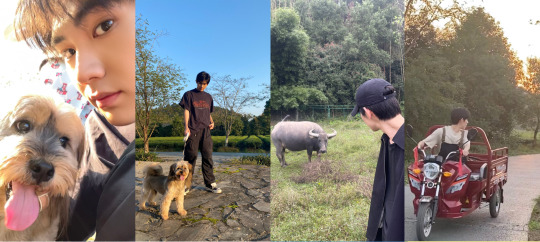
Wrapping Ceremony
November 1st, 2023
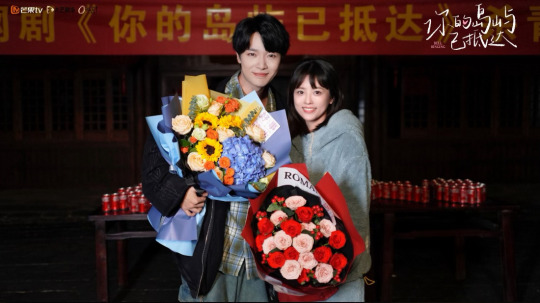
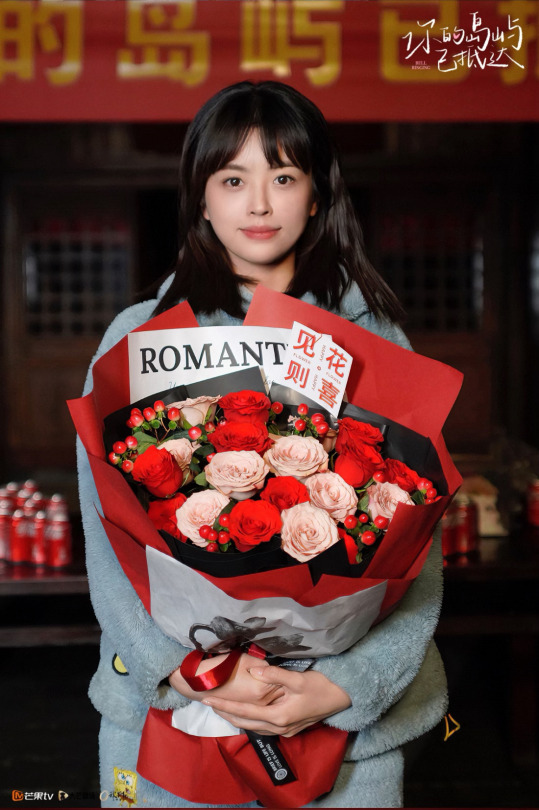
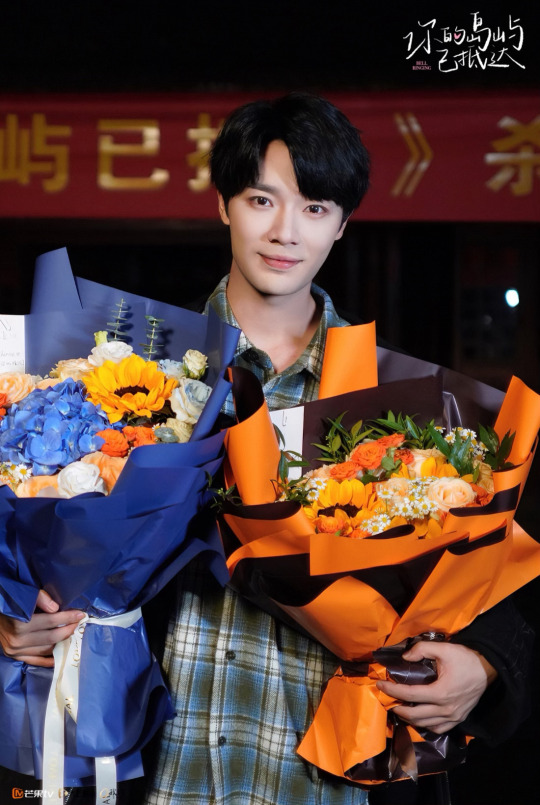
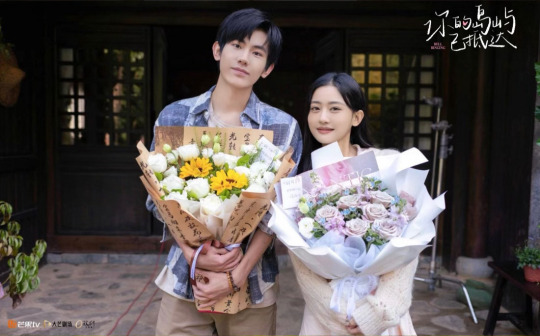
More at [Source] I've reached the per-post limit
All the best wishes for the cast and crew! Looking forward to the drama!
Follow-up Post
Includes trailers and more photos
#Will the 100yrs Ago part include a shirtless warrior Li Daikun? Who knows. He's been working out. It's a good view. We can hope.#Bell Ringing#cdrama#chinese drama#Li Daikun#Song Fangyuan#Miao Weilun#Yu Yilei#Zhuang Yuan#你的岛屿已抵达#screencaps#original post#B text post
19 notes
·
View notes
Text



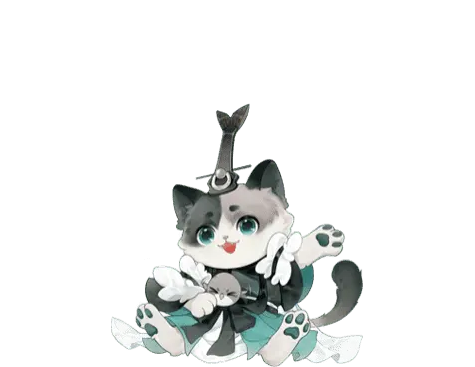

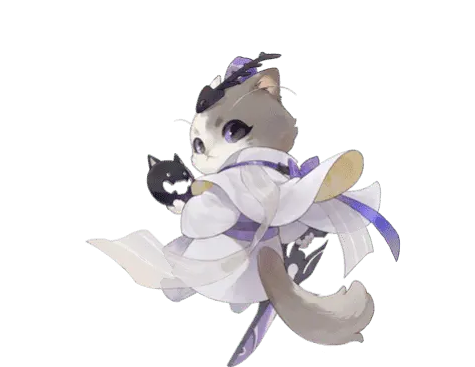


All mao-maos in the game (pt 3) - WESTERN CHU, THREE KINGDOMS, JIN, NORTH AND SOUTHERN DYNASTIES + Hua Mulan
Xiang Yu - Cao Zhi - Zhao Yun Xie Xuan - Tao Yuanming Guo Changgong - Zu Chongzhi - Hua Mulan
[1] [2] [3] [4]
2 notes
·
View notes
